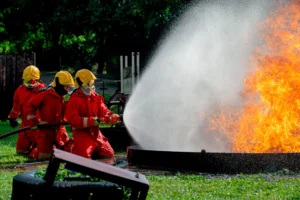
Fire Safety Tips in Factories and Warehouses
Fire safety is a critical concern in factories and warehouses due to the potential for significant harm to both individuals and assets. These environments often house flammable materials, heavy machinery,
Book your FREE, no-strings-attached Fire Safety Audit to ensure that you’re properly protected from the risk and comply with current fire safety legislation.
Get essential insights and updates
in fire safety – straight to your inbox!
Fire safety is crucial for every business, institution, and community. One key role that helps maintain fire safety standards is the fire marshal. Proper training equips fire marshals with the knowledge and skills they need to prevent fires, respond effectively to emergencies, and ensure compliance with fire safety regulations. In this guide, we’ll explore what fire marshal training involves, why it’s important, and how it benefits different environments.
Fire marshals are at the front line when it comes to protecting lives and property from the risks of fire. Their responsibilities range from identifying fire hazards and conducting regular inspections to coordinating fire drills and ensuring everyone follows fire safety protocols. To do all this effectively, fire marshals need the right training. Here’s why it’s so essential:
Fire marshal training is comprehensive, covering a wide range of topics to prepare individuals for their role. Here are the core components:
Investing in fire marshal training brings numerous benefits to organizations and communities:
Fire marshal training is a key part of any robust fire safety strategy. It empowers individuals with the skills and knowledge they need to prevent fires, handle emergencies, and keep everyone compliant with safety regulations. By investing in quality fire marshal training, organizations and communities can create safer environments and better protect lives and property from the devastating effects of fire.

Fire safety is a critical concern in factories and warehouses due to the potential for significant harm to both individuals and assets. These environments often house flammable materials, heavy machinery,

In the waste and recycling industry, the risk of fire is significant. Early detection and targeted suppression are crucial for preventing disasters. Advanced sensors alert workers to potential fires, allowing

Fire drills, though often viewed as disruptive, are crucial for practicing safe evacuation procedures. They help reveal potential gaps in evacuation planning that could be vital in a real fire
Video Smoke Detection is perfect for a fast response to fires in high roofed buildings and harsh operating conditions.
Watch Smokecatcher detect smoke in an MSW storage building. The smoke is coming through from a fire in the adjoining storage area.
Watch Smokecatcher detect a fire in an SRF Storage bunker. Sadly, the alarm wasn’t responded to and the site lost a 4hr window of opportunity between smoke detection and flames appearing.
Video Smoke Detection overcomes the risks of stratification and other challenges for early fire detection in logistics and storage facilities.
Watch Fire Rover detect and suppress a fire in the waste bunker at an EFW facility!
See how the Fire Rover detects and suppresses this fire at a clients tipping hall. Note how the smok is spreading out at low leve, rather than rising. This is called ‘stratification’ and is one of the many reasons why roof-mounted smoke detection systems like beam detectors and HSSD is not suitable for many recycling applications.
Watch the Fire Rover detect and suppress a fire at a battery storage facility. This targeted and intellegent control makes the Fire Rover particularly well suited to high hazard storage applications.
Watch the Fire Rover tackle a battery fire in a tipping hall. Note how the exploding battery cells start three separate fires, which the operator individually suppresses (whilst avoiding the site operators in the vicinity).
Get essential insights and updates in fire safety – straight to your inbox!